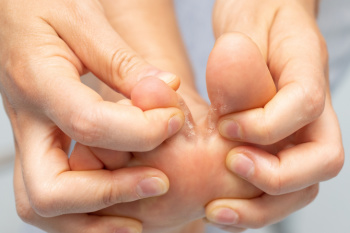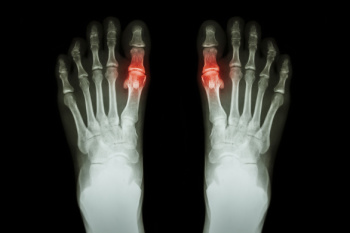
Foot disorders in the elderly population are common due to natural aging, changes in biomechanics, and the long-term effects of chronic conditions. As people age, their feet may lose strength, flexibility, and cushioning. This process increases the risk of developing arthritis, bunions, hammertoes, and poor circulation. Biomechanical changes can alter walking patterns, leading to instability and discomfort. These issues can impact mobility, independence, and overall well-being. A podiatrist can assess the feet, diagnose underlying problems, and provide personalized treatment, including custom orthotics and footwear recommendations. If you are experiencing any foot pain, it is suggested that you schedule a visit with a podiatrist who can treat various foot conditions and guide you on foot care tips.
If you need your feet checked, contact Desiree Garzon, DPM of County Wide Foot, Ankle, & Wound Care. Our doctor will attend to all of your foot and ankle needs and provide you with quality treatment.
Geriatrics and Podiatry
When people age, some common issues that may occur are bone density loss, dry skin, poor circulation, and rough brittle nails. These issues may also affect your foot health if the necessary steps are not taken to alleviate the problems.
It is important to take care of your feet because feet that are injured or diseased can affect your overall health. Having painful feet hinders your ability to do daily activities or may decrease your willingness to do the things that you need to do.
Visiting Your Geriatrician
As we age, health problems become more likely, so it is essential to visit your doctor for check-ups to ensure that you are doing the best you can to take care of your health. It is recommended to check your feet frequently for any possible cuts, bruises, swelling, corns or any other irregularities.
Taking Care of Elderly Feet
Cracked or dry feet can be treated by applying moisturizer often. It is also important not to wear old socks because the older the sock is, the higher the possibility there will be that there is bacteria there. Wear fresh socks and make sure they fit properly.
Proper foot health means that you can have a more active lifestyle and you will not be bogged down by pain. Foot health also leads to good circulation, which is paramount for overall health.
If you have any questions, please feel free to contact our offices located in Boynton Beach, and Wellington, FL . We offer the newest diagnostic tools and technology to treat your foot and ankle needs.

Athlete’s foot is a fungal infection that affects the skin between toes, underneath the soles, and around the ankles. Athlete's foot often causes itching, scaling, cracking, and occasional discomfort due to inflammation and moisture buildup in the foot's natural crevices. In some cases, small blisters may appear, and skin may fissure, especially in areas subject to friction from shoes or socks. When left untreated, the infection can spread across the foot and create openings that allow bacteria to enter, increasing the risk of secondary infection. A podiatrist can evaluate the extent of the infection, identify secondary complications, and recommend an appropriate course of treatment to restore skin integrity. This may involve debriding thickened skin, prescribing appropriate topical or systemic antifungal agents, and advising on footwear modifications to reduce moisture and friction. If you have developed an athlete's foot infection that has become problematic, it is suggested that you schedule an appointment with a podiatrist for appropriate treatment.
Athlete’s Foot
Athlete’s foot is often an uncomfortable condition to experience. Thankfully, podiatrists specialize in treating athlete’s foot and offer the best treatment options. If you have any questions about athlete’s foot, consult with Desiree Garzon, DPM from County Wide Foot, Ankle, & Wound Care. Our doctor will assess your condition and provide you with quality treatment.
What Is Athlete’s Foot?
Tinea pedis, more commonly known as athlete’s foot, is a non-serious and common fungal infection of the foot. Athlete’s foot is contagious and can be contracted by touching someone who has it or infected surfaces. The most common places contaminated by it are public showers, locker rooms, and swimming pools. Once contracted, it grows on feet that are left inside moist, dark, and warm shoes and socks.
Prevention
The most effective ways to prevent athlete’s foot include:
- Thoroughly washing and drying feet
- Avoid going barefoot in locker rooms and public showers
- Using shower shoes in public showers
- Wearing socks that allow the feet to breathe
- Changing socks and shoes frequently if you sweat a lot
Symptoms
Athlete’s foot initially occurs as a rash between the toes. However, if left undiagnosed, it can spread to the sides and bottom of the feet, toenails, and if touched by hand, the hands themselves. Symptoms include:
- Redness
- Burning
- Itching
- Scaly and peeling skin
Diagnosis and Treatment
Diagnosis is quick and easy. Skin samples will be taken and either viewed under a microscope or sent to a lab for testing. Sometimes, a podiatrist can diagnose it based on simply looking at it. Once confirmed, treatment options include oral and topical antifungal medications.
If you have any questions, please feel free to contact our offices located in Boynton Beach, and Wellington, FL . We offer the newest diagnostic and treatment technologies for all your foot care needs.

Gout is a form of inflammatory arthritis caused by the buildup of uric acid crystals in the joints, often affecting the big toe. This buildup, known as hyperuricemia, occurs when the body produces too much uric acid or fails to eliminate it efficiently. Common causes include a diet rich in purines, kidney dysfunction, or certain medications. Symptoms involve sudden and intense big toe joint pain, redness, swelling, and warmth. Diagnosis is made through blood tests, imaging, or joint fluid analysis. A podiatrist can help manage gout flares, recommend footwear modifications, and offer strategies to reduce pressure on affected joints. If you have had one or more gout attacks, it is suggested that you are under the care of a podiatrist who can help you to manage this painful condition.
Gout is a painful condition that can be treated. If you are seeking treatment, contact Desiree Garzon, DPM from County Wide Foot, Ankle, & Wound Care. Our doctor will treat your foot and ankle needs.
What Is Gout?
Gout is a form of arthritis that is characterized by sudden, severe attacks of pain, redness, and tenderness in the joints. The condition usually affects the joint at the base of the big toe. A gout attack can occur at any random time, such as the middle of the night while you are asleep.
Symptoms
- Intense Joint Pain - Usually around the large joint of your big toe, and it most severe within the first four to twelve hours
- Lingering Discomfort - Joint discomfort may last from a few days to a few weeks
- Inflammation and Redness -Affected joints may become swollen, tender, warm and red
- Limited Range of Motion - May experience a decrease in joint mobility
Risk Factors
- Genetics - If family members have gout, you’re more likely to have it
- Medications - Diuretic medications can raise uric acid levels
- Gender/Age - Gout is more common in men until the age of 60. It is believed that estrogen protects women until that point
- Diet - Eating red meat and shellfish increases your risk
- Alcohol - Having more than two alcoholic drinks per day increases your risk
- Obesity - Obese people are at a higher risk for gout
Prior to visiting your podiatrist to receive treatment for gout, there are a few things you should do beforehand. If you have gout you should write down your symptoms--including when they started and how often you experience them, important medical information you may have, and any questions you may have. Writing down these three things will help your podiatrist in assessing your specific situation so that he or she may provide the best route of treatment for you.
If you have any questions, please feel free to contact our offices located in Boynton Beach, and Wellington, FL . We offer the newest diagnostic and treatment technologies for all your foot care needs.

